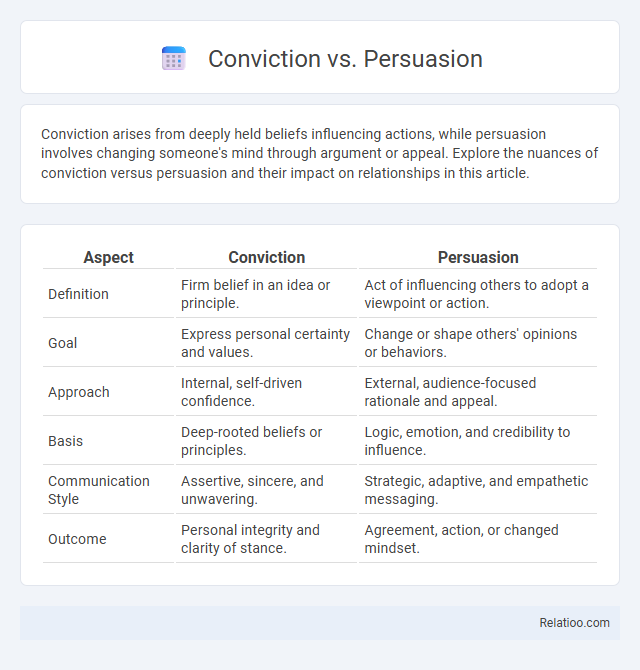Conviction arises from deeply held beliefs influencing actions, while persuasion involves changing someone's mind through argument or appeal. Explore the nuances of conviction versus persuasion and their impact on relationships in this article.
Table of Comparison
| Aspect | Conviction | Persuasion |
|---|---|---|
| Definition | Firm belief in an idea or principle. | Act of influencing others to adopt a viewpoint or action. |
| Goal | Express personal certainty and values. | Change or shape others' opinions or behaviors. |
| Approach | Internal, self-driven confidence. | External, audience-focused rationale and appeal. |
| Basis | Deep-rooted beliefs or principles. | Logic, emotion, and credibility to influence. |
| Communication Style | Assertive, sincere, and unwavering. | Strategic, adaptive, and empathetic messaging. |
| Outcome | Personal integrity and clarity of stance. | Agreement, action, or changed mindset. |
Understanding Conviction: Definition and Core Principles
Understanding conviction involves recognizing it as a firm belief or unwavering confidence in an idea or principle, often rooted in personal values and experiences. Core principles of conviction include consistency, authenticity, and emotional commitment, which distinguish it from persuasion, where the goal is to influence others' beliefs or actions. Your ability to demonstrate genuine conviction can significantly enhance credibility and inspire trust in both personal and professional contexts.
What Is Persuasion? Key Concepts and Elements
Persuasion is the process of influencing someone's attitudes, beliefs, or behaviors through communication by appealing to logic, emotions, or credibility. Key elements include the persuader, the message, the medium, and the audience, with successful persuasion often relying on ethos (credibility), pathos (emotional appeal), and logos (logical argument). Understanding these components enhances the ability to craft effective persuasive strategies in marketing, public speaking, and interpersonal communication.
Conviction vs Persuasion: The Fundamental Differences
Conviction refers to a firmly held belief or certainty that drives your decisions, while persuasion is the act of influencing others to adopt a belief or take action. Conviction comes from internal confidence and strong evidence, whereas persuasion relies on effective communication techniques and emotional appeal. Understanding these fundamental differences helps you distinguish between genuine personal belief and the art of convincing others.
The Psychology Behind Conviction and Persuasion
Conviction originates from deep-rooted beliefs shaped by personal values and experiences, creating a powerful internal certainty that drives consistent behavior. Persuasion relies on influencing others through effective communication, emotional appeal, and logical reasoning to change attitudes or behaviors temporarily. Understanding the psychological mechanisms such as cognitive dissonance and social proof helps you leverage both conviction and persuasion for impactful decision-making and influence.
Role of Emotions in Conviction and Persuasion
Emotions play a pivotal role in both conviction and persuasion, acting as the driving force behind belief and behavior change. In conviction, your emotional connection to a deeply held value solidifies unwavering commitment, making your stance resilient to opposing views. Persuasion leverages emotional appeals to influence and motivate others, shaping their attitudes by tapping into feelings like trust, fear, or desire.
How Conviction Shapes Decision-Making
Conviction strongly influences decision-making by providing unwavering confidence in one's beliefs, allowing you to act decisively even under uncertainty. Unlike persuasion, which aims to change opinions through argument or appeal, conviction roots decisions in deeply held values and principles. This internal certainty often leads to consistent, goal-driven actions that shape long-term outcomes.
Techniques and Strategies of Effective Persuasion
Effective persuasion techniques include understanding your audience's beliefs and values, using emotional appeals, and presenting clear, logical arguments supported by credible evidence. Strategies such as storytelling, repetition, and social proof enhance your ability to influence attitudes and behaviors while maintaining authenticity. Mastering the distinction between conviction--firm belief in your message--and persuasion--the art of guiding others to share that belief--empowers you to communicate compellingly and ethically.
Real-Life Examples: Conviction in Action vs Persuasion in Practice
Conviction drives individuals to take unwavering stands, exemplified by Malala Yousafzai's steadfast advocacy for girls' education despite threats to her safety. Persuasion works through influence and negotiation, such as a marketing campaign that convinces consumers to switch brands by addressing their needs and desires. In real-life scenarios, conviction showcases deep personal commitment that motivates action, while persuasion demonstrates strategic communication designed to change others' opinions or behaviors.
When to Use Conviction and When to Persuade
Use conviction when confidently asserting your beliefs or decisions based on strong evidence or principles, especially in leadership or advocacy to inspire trust and authority. Persuasion is more effective when aiming to influence others' opinions or behaviors through emotional appeal, logic, or negotiation in collaborative or sales contexts. Conviction strengthens your position by demonstrating unwavering commitment, while persuasion facilitates change by addressing others' concerns and motivations.
Balancing Conviction and Persuasion for Impactful Communication
Balancing conviction and persuasion is key to impactful communication, as conviction provides the confidence and authenticity that resonate with your audience, while persuasion adapts your message to their values and needs. Effective communicators combine steadfast beliefs with strategic empathy, ensuring your message is both compelling and relatable. Mastering this balance increases influence, fosters trust, and drives meaningful engagement in any dialogue.

Infographic: Conviction vs Persuasion
 relatioo.com
relatioo.com